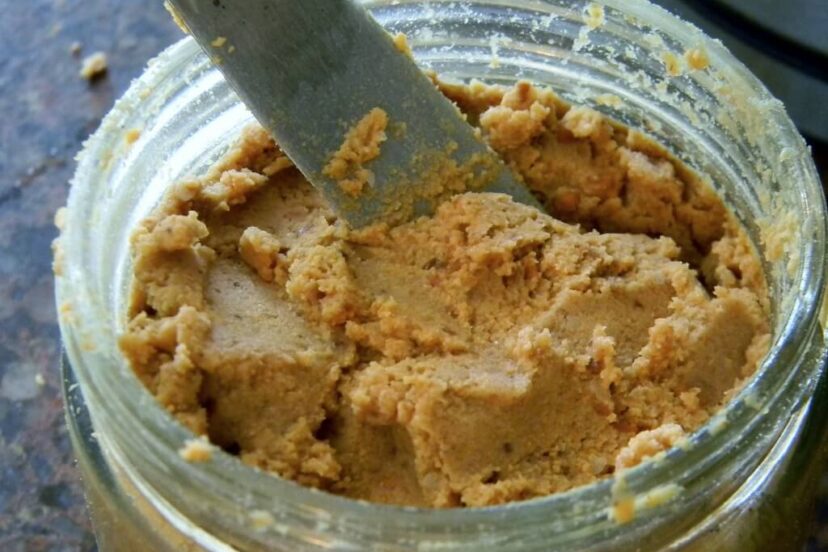The Skinny on Reduced Fat Peanut Butter for Dogs
Hey fellow dog lovers! Welcome to Doggie Info, where we delve into the intricacies of canine care, with a special focus on their diet in this article. Sharing insights into a topic close to my heart and crucial for all dog parents: the use of reduced fat peanut butter and its implications on our furry friends. We’re going to navigate through the world of reduced fat peanut butter, uncover its implications for our furry friends, and address the lurking danger of xylitol. Having been both a dog parent and an advisor for many decades, I’ve seen my fair share of treat trends and health scares. One of the most perplexing and alarming topics I’ve encountered is the use of reduced fat peanut butter in dog treats, especially when it contains xylitol.
There’s been a noticeable shift towards health-conscious pet care, mirroring the trend seen in human nutrition. As a devoted dog parent and an advisor on all things canine, I’ve observed this change closely, and it’s truly fascinating. Reduced fat peanut butter seems like a healthier option, right? But here’s the catch – not everything that’s good for humans is good for dogs. When it comes to treats, especially peanut butter, it’s crucial to read the labels and understand the implications of what we’re feeding our beloved dogs.
I embarked on this journey out of love for my four-legged companions, driven by a passion to understand their needs and ensure their wellbeing. Over the years, I’ve navigated through the vast ocean of canine nutrition, learning and unlearning, adapting to new knowledge, and sharing this with fellow dog parents. This journey has allowed me to experiment with various dog diets, treats, and health products. It has been a learning curve, filled with trials, errors, and a lot of tail wagging! So, let’s jump right into the heart of today’s topic: reduced fat peanut butter.
Understanding Reduced Fat Peanut Butter & The Basics of Reduced Fat Peanut Butter
Peanut butter is a treat that most dogs go nuts for! But with obesity in pets on the rise, many dog parents are opting for reduced fat versions. Is it a safer option though? Reduced fat peanut butter is essentially what it sounds like – it has less fat content compared to regular peanut butter. However, it’s crucial to note that reduced doesn’t mean low fat. The reduction is relative to that brand’s regular product.
Regular peanut butter is made by grinding peanuts, and it usually contains fats that are natural and healthy for humans. However, when the fat content is reduced, other ingredients are added to compensate for the lost flavor and texture. One of those additives could be xylitol, a sugar substitute, which is harmless to humans however it is toxic to dogs.
Benefits and Concerns of Reduced Fat Peanut Butter for Dogs
Choosing reduced fat peanut butter could be beneficial in managing your dog’s weight. Less fat means fewer calories, right? Well, it’s not always that straightforward. The fat is often replaced with other ingredients to maintain the taste and texture, which could still be calorific. While exploring reduced fat peanut butter options, you might come across products containing xylitol. Reduced fat peanut butter may seem like a good idea for overweight dogs or those with pancreatitis, the risk associated with xylitol is too high to ignore. Even small amounts of xylitol can cause hypoglycemia (low blood sugar), seizures, liver failure, or even death in dogs.
What is Xylitol?
Xylitol is a sugar alcohol commonly used in sugar-free products. It’s gaining popularity in various food items for its low-calorie sweetness, but its effects on dogs are devastating. While Xylitol is safe for humans it is highly toxic to dogs. Ingesting even a small amount can lead to rapid insulin release in dogs, causing hypoglycemia, seizures, and in severe cases, death.
It’s imperative for dog parents to understand the gravity of the toxic effects of xylitol poisoning. When dogs ingest xylitol, their bodies mistake it for glucose and start to produce a rapid release of insulin. This sudden spike in insulin leads to a rapid and severe decrease in blood sugar levels, which can be life-threatening. Symptoms can appear within 10-60 minutes and include vomiting, loss of coordination, and lethargy. If you suspect your dog has ingested xylitol, immediate veterinary attention is crucial.
Safe Treat Alternatives
There are safe and delicious alternatives to ensure your pup doesn’t miss out on the peanut butter fun!
Natural Peanut Butter
Natural peanut butter is a safer option, look for brands that list peanuts as the only ingredient. Make sure the natural peanut butter brand you choose does not contain any additives, including added sugar, salt and xylitol. Always read the ingredient label. Your dog will thank you with wagging tails and happy barks!
Other Dog-Friendly Treats
There are also numerous dog-friendly treats available that are both safe and nutritious. From homemade recipes to store-bought options, the possibilities are endless.
Homemade Treats
Making your own dog treats at home can be a fun and safe alternative. You have control over the ingredients, ensuring your dog gets a tasty and safe treat.
Reduced Fat Peanut Butter Practical Tips for Dog Parents
Navigating the world of dog treats can be overwhelming, but here are some practical tips to guide you through.
Reading Labels Carefully Always read ingredient labels carefully. If xylitol is listed, or if you’re unsure about any ingredient, it’s best to steer clear and choose a safer option.
- Monitoring Your Dog’s Reaction: Even when giving safe treats, it’s important to observe your dog’s reaction. All dogs are different, and what works for one may not work for another.
- Recommended Portions: Treats should only make up 10% of your dog’s daily caloric intake. Be mindful of portion sizes and consult with your vet if you’re unsure. They can provide personalized advice based on your dog’s health, age, and dietary needs.
My Personal Experience and Recommendations
In my many decades as a dog parent, I’ve found that natural treats and responsible portion sizes contribute significantly to my dogs’ health and happiness.
There are several dog-friendly peanut butter brands on the market that explicitly state they are xylitol-free. Making your own peanut butter is always an option, check out my Simple Home Made Recipe. To reduce the fat, you can add a filler like pumpkin puree or unsweetened apple sauce. Just remember, do not add any sugar or salt! I also provide my pup with Natural Peanut Butter that is made from only peanuts, no additives. These are products I trust and recommend.
Conclusion
While reduced fat peanut butter might seem like a healthier option for your furry friend, it’s crucial to be vigilant of the ingredients. Avoid products containing xylitol and opt for natural, dog-safe alternatives. Navigating the world of dog treats can be tricky, but armed with knowledge and a vigilant eye, we can make safe and healthy choices for our furry friends. Your canine companion depends on you for their well-being, and making informed choices is a huge part of this responsibility.
FAQs
Q1.: Is reduced fat peanut butter safe for dogs?
A: While it might be tempting to go for a reduced-fat option, it’s crucial to read the label to make sure there are no harmful additives like xylitol.
Q2.: Is regular peanut butter safe for dogs?
A: Yes, as long as it doesn’t contain xylitol or excessive amounts of added sugars and salts.
Q3.: How can I tell if peanut butter is safe for my dog?
A: Check the ingredients list for xylitol or other artificial sweeteners, and opt for natural, unsweetened peanut butter, without added sugar or salt. Xylitol is usually listed under sweeteners.
Q4.: How much peanut butter can I safely give to my dog?
Treats should only make up 10% of your dog’s daily caloric intake. Consult with your vet for specific recommendations.
Q5.: What should I do if my dog ingests xylitol?
A: Contact your vet or an emergency pet poison hotline immediately, as xylitol ingestion can be life-threatening. Xylitol poisoning can rapidly become fatal.




